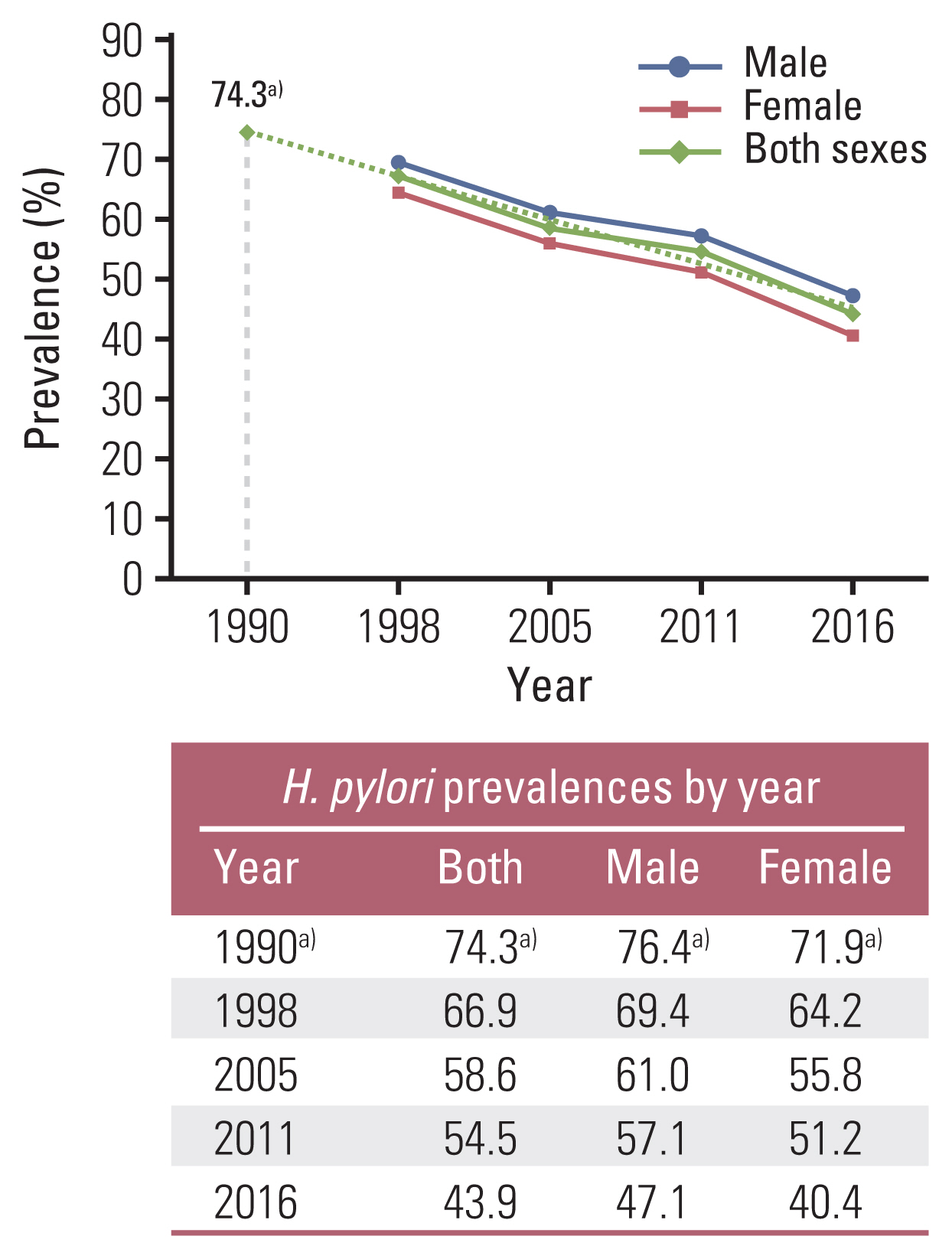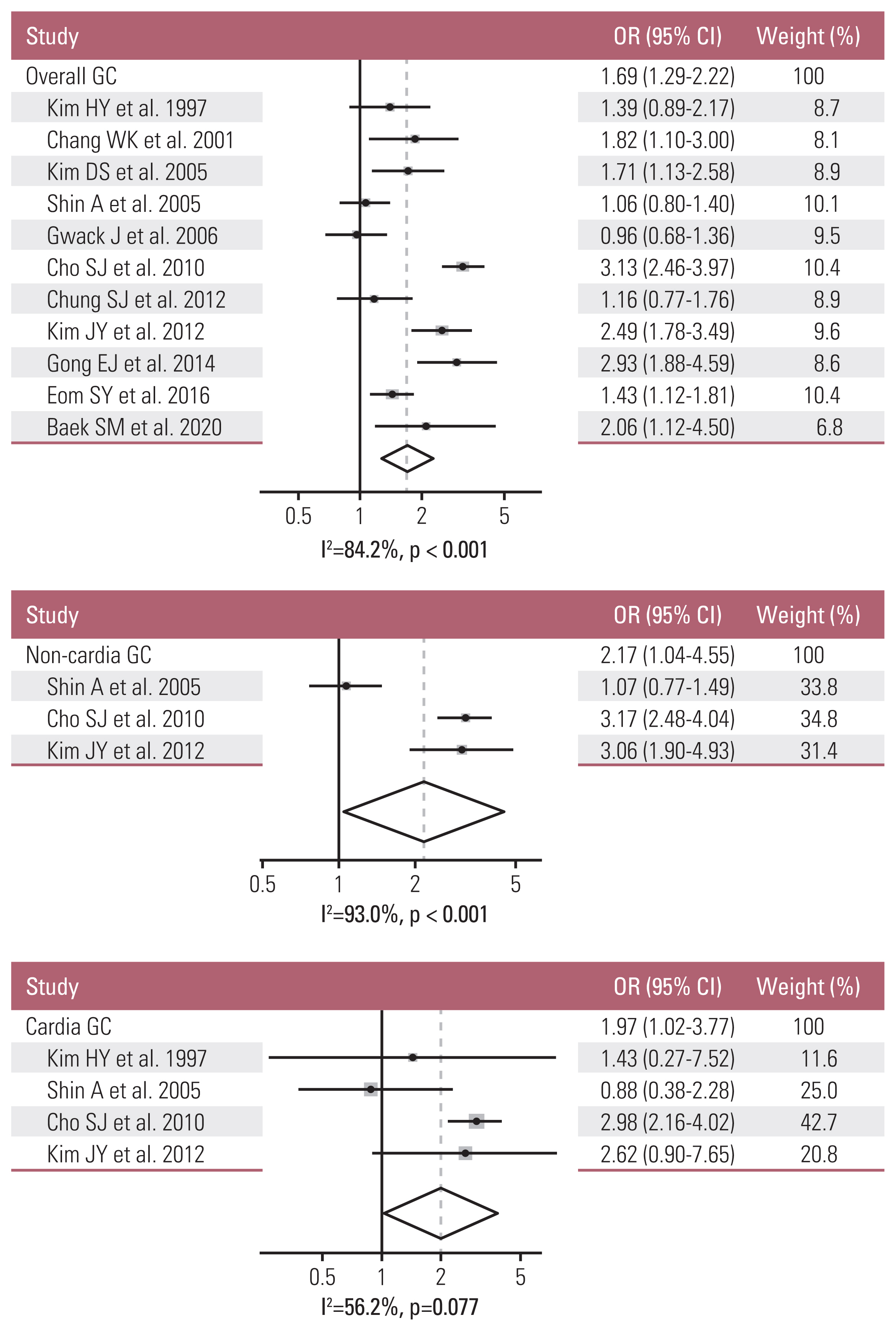Cancer Res Treat.
2021 Jul;53(3):744-753. 10.4143/crt.2020.610.
Population Attributable Fraction of Helicobacter pylori Infection–Related Gastric Cancer in Korea: A Meta-Analysis
- Affiliations
-
- 1Department of Cancer Control and Population Health, National Cancer Center Graduate School of Cancer Science and Policy, National Cancer Center, Goyang, Korea
- KMID: 2518398
- DOI: http://doi.org/10.4143/crt.2020.610
Abstract
- Purpose
This study aimed to determine the proportion of gastric cancer attributable to Helicobactor pylori in the Korean population. Infection with H. pylori has been recognized as the most significant risk factor for gastric cancer. In Korea, gastric cancer is the most common cancer that accounted for 13.3% of all cancers in 2016. In particular, men are most commonly diagnosed with gastric cancer; the age-standardized incidence rate in men is 49.6 per 100,000, which is more than twice the incidence in women.
Materials and Methods
The population attributable fraction (PAF) was calculated as a function of the relative risk (RR) of gastric cancer associated with H. pylori infections. To estimate PAF of gastric cancer due to H. pylori, the prevalence of H. pylori infections was extrapolated for the year of 1990 and a pooled RR was obtained by conducting a meta-analysis of studies recently published in Korea.
Results
The estimated prevalence of H. pylori was 76.4% in men and 71.9% in women. The RRs (95% confidence interval) pooled from case-control studies using a random effects model was 1.69 (1.29-2.22) for overall gastric cancer and 2.17 (1.04-4.55) for non-cardia gastric cancer. Using the RR for overall gastric cancer, the estimated PAFs due to H. pylori were 34.5% in men and 33.2% in women.
Conclusion
The occurrence of gastric cancer in Koreans may be affected by other risk factors in addition to H. pylori infection, which may contribute to increasing baseline risk for gastric cancer.
Figure
Reference
-
References
1. Balakrishnan M, George R, Sharma A, Graham DY. Changing trends in stomach cancer throughout the world. Curr Gastroenterol Rep. 2017; 19:36.
Article2. Jung KW, Won YJ, Kong HJ, Lee ES. Cancer statistics in Korea: incidence, mortality, survival, and prevalence in 2016. Cancer Res Treat. 2019; 51:417–30.
Article3. World Cancer Research Fund International. Diet, nutrition, physical activity and stomach cancer [Internet]. London: World Cancer Research Fund International;c2016. [cited 2019 Dec 20]. Available from: https://www.wcrf.org/sites/default/files/Stomach-Cancer-2016-Report.pdf .4. IARC Working Group on the Evaluation of Carcinogenic Risk to Humans. Schistosomes, liver flukes and Helicobacter pylori. IARC Monographs on the Evaluation of Carcinogenic Risks to Humans, No. 61 [Internet]. Lyon: International Agency for Research on Cancer;1994. [cited 2019 Dec 20]. Available from: https://www.ncbi.nlm.nih.gov/books/NBK487782/ .5. Ko KP. Epidemiology of gastric cancer in Korea. J Korean Med Assoc. 2019; 62:398–406.
Article6. Lim SH, Kwon JW, Kim N, Kim GH, Kang JM, Park MJ, et al. Prevalence and risk factors of Helicobacter pylori infection in Korea: nationwide multicenter study over 13 years. BMC Gastroenterol. 2013; 13:104.
Article7. Kim N, Kim JJ, Choe YH, Kim HS, Kim JI, Chung IS, et al. Diagnosis and treatment guidelines for Helicobacter pylori infection in Korea. Korean J Gastroenterol. 2009; 54:269–78.
Article8. Brooks-Pollock E, Danon L. Defining the population attributable fraction for infectious diseases. Int J Epidemiol. 2017; 46:976–82.
Article9. Hanley JA. A heuristic approach to the formulas for population attributable fraction. J Epidemiol Community Health. 2001; 55:508–14.
Article10. Levin ML. The occurrence of lung cancer in man. Acta Unio Int Contra Cancrum. 1953; 9:531–41.11. Lim SH, Kim N, Kwon JW, Kim SE, Baik GH, Lee JY, et al. Trends in the seroprevalence of Helicobacter pylori infection and its putative eradication rate over 18 years in Korea: a cross-sectional nationwide multicenter study. PLoS One. 2018; 13:e0204762.
Article12. Bae JM, Kim EH. Helicobacter pylori infection and risk of gastric cancer in Korea: a quantitative systematic review. J Prev Med Public Health. 2016; 49:197–204.13. Kim HY, Cho BD, Chang WK, Kim DJ, Kim YB, Park CK, et al. Helicobacter pylori infection and the risk of gastric cancer among the Korean population. J Gastroenterol Hepatol. 1997; 12:100–3.
Article14. Chang WK, Kim HY, Kim DJ, Lee J, Park CK, Yoo JY, et al. Association between Helicobacter pylori infection and the risk of gastric cancer in the Korean population: prospective case-controlled study. J Gastroenterol. 2001; 36:816–22.
Article15. Kim DS, Lee MS, Kim YS, Kim DH, Bae JM, Shin MH, et al. Effect modification by vitamin C on the relation between gastric cancer and Helicobacter pylori. Eur J Epidemiol. 2005; 20:67–71.
Article16. Shin A, Shin HR, Kang D, Park SK, Kim CS, Yoo KY. A nested case-control study of the association of Helicobacter pylori infection with gastric adenocarcinoma in Korea. Br J Cancer. 2005; 92:1273–5.
Article17. Gwack J, Shin A, Kim CS, Ko KP, Kim Y, Jun JK, et al. CagA-producing Helicobacter pylori and increased risk of gastric cancer: a nested case-control study in Korea. Br J Cancer. 2006; 95:639–41.
Article18. Cho SJ, Choi IJ, Kim CG, Lee JY, Kook MC, Seong MW, et al. Helicobacter pylori seropositivity is associated with gastric cancer regardless of tumor subtype in Korea. Gut Liver. 2010; 4:466–74.
Article19. Chung SJ, Park MJ, Kang SJ, Kang HY, Chung GE, Kim SG, et al. Effect of annual endoscopic screening on clinicopathologic characteristics and treatment modality of gastric cancer in a high-incidence region of Korea. Int J Cancer. 2012; 131:2376–84.
Article20. Kim JY, Lee HS, Kim N, Shin CM, Lee SH, Park YS, et al. Prevalence and clinicopathologic characteristics of gastric cardia cancer in South Korea. Helicobacter. 2012; 17:358–68.
Article21. Gong EJ, Ahn JY, Jung HY, Lim H, Choi KS, Lee JH, et al. Risk factors and clinical outcomes of gastric cancer identified by screening endoscopy: a case-control study. J Gastroenterol Hepatol. 2014; 29:301–9.
Article22. Eom SY, Hong SM, Yim DH, Kwon HJ, Kim DH, Yun HY, et al. Additive interactions between PRKAA1 polymorphisms and Helicobacter pylori CagA infection associated with gastric cancer risk in Koreans. Cancer Med. 2016; 5:3236–335.23. Baek SM, Kim N, Kwon YJ, Lee HS, Kim HY, Lee J, et al. Role of serum pepsinogen II and Helicobacter pylori status in the detection of diffuse-type early gastric cancer in young individuals in South Korea. Gut Liver. 2020; 14:439–49.
Article24. Higgins JP, Thompson SG. Quantifying heterogeneity in a meta-analysis. Stat Med. 2002; 21:1539–58.
Article25. Lee SH, Kim MC, Jeon SW, Lee KN, Park JJ, Hong SJ. Risk factors and clinical outcomes of non-curative resection in patients with early gastric cancer treated with endoscopic submucosal dissection: a retrospective multicenter study in Korea. Clin Endosc. 2020; 53:196–205.
Article26. Shin A, Park S, Shin HR, Park EH, Park SK, Oh JK, et al. Population attributable fraction of infection-related cancers in Korea. Ann Oncol. 2011; 22:1435–42.
Article27. Ko KP, Shin A, Cho S, Park SK, Yoo KY. Environmental contributions to gastrointestinal and liver cancer in the Asia-Pacific region. J Gastroenterol Hepatol. 2018; 33:111–20.
Article28. Helicobacter and Cancer Collaborative Group. Gastric cancer and Helicobacter pylori: a combined analysis of 12 case control studies nested within prospective cohorts. Gut. 2001; 49:347–53.29. Jiang J, Chen Y, Shi J, Song C, Zhang J, Wang K. Population attributable burden of Helicobacter pylori-related gastric cancer, coronary heart disease, and ischemic stroke in China. Eur J Clin Microbiol Infect Dis. 2017; 36:199–212.
Article30. Shikata K, Doi Y, Yonemoto K, Arima H, Ninomiya T, Kubo M, et al. Population-based prospective study of the combined influence of cigarette smoking and Helicobacter pylori infection on gastric cancer incidence: the Hisayama Study. Am J Epidemiol. 2008; 168:1409–15.
Article31. Kim N. Chemoprevention of gastric cancer by Helicobacter pylori eradication and its underlying mechanism. J Gastroenterol Hepatol. 2019; 34:1287–95.32. Oh S, Kim N, Kwon JW, Shin CM, Choi YJ, Lee DH, et al. Effect of Helicobacter pylori eradication and ABO genotype on gastric cancer development. Helicobacter. 2016; 21:596–605.33. Choi JM, Kim SG, Choi J, Park JY, Oh S, Yang HJ, et al. Effects of Helicobacter pylori eradication for metachronous gastric cancer prevention: a randomized controlled trial. Gastrointest Endosc. 2018; 88:475–85.
Article34. Choi IJ, Kook MC, Kim YI, Cho SJ, Lee JY, Kim CG, et al. Helicobacter pylori therapy for the prevention of metachronous gastric cancer. N Engl J Med. 2018; 378:1085–95.
Article35. Malfertheiner P. Helicobacter pylori treatment for gastric cancer prevention. N Engl J Med. 2018; 378:1154–6.
Article36. Fock KM, Ang TL. Epidemiology of Helicobacter pylori infection and gastric cancer in Asia. J Gastroenterol Hepatol. 2010; 25:479–86.37. Jagerstad M, Skog K. Genotoxicity of heat-processed foods. Mutat Res. 2005; 574:156–72.38. D’Elia L, Rossi G, Ippolito R, Cappuccio FP, Strazzullo P. Habitual salt intake and risk of gastric cancer: a meta-analysis of prospective studies. Clin Nutr. 2012; 31:489–98.
Article39. Kim J, Park S, Nam BH. Gastric cancer and salt preference: a population-based cohort study in Korea. Am J Clin Nutr. 2010; 91:1289–93.
Article40. Yang S, Lee J, Choi IJ, Kim YW, Ryu KW, Sung J, et al. Effects of alcohol consumption, ALDH2 rs671 polymorphism, and Helicobacter pylori infection on the gastric cancer risk in a Korean population. Oncotarget. 2017; 8:6630–41.
Article41. Butt J, Varga MG, Wang T, Tsugane S, Shimazu T, Zheng W, et al. Smoking, Helicobacter pylori serology, and gastric cancer risk in prospective studies from China, Japan, and Korea. Cancer Prev Res (Phila). 2019; 12:667–74.
Article
- Full Text Links
- Actions
-
Cited
- CITED
-
- Close
- Share
- Similar articles
-
- The Association between Helicobacter pylori Infection and Gastric Adenocarcinoma: a Review of the Literature
- Helicobacter pylori Eradication Therapy and Gastric Cancer Prevention
- Prevention of Gastric Cancer: Helicobacter pylori Treatment
- Two Cases of Gastric Stump Cancer: Possible Role of Helicobacter pylori Infection
- Epidemiology of gastric cancer in Korea




